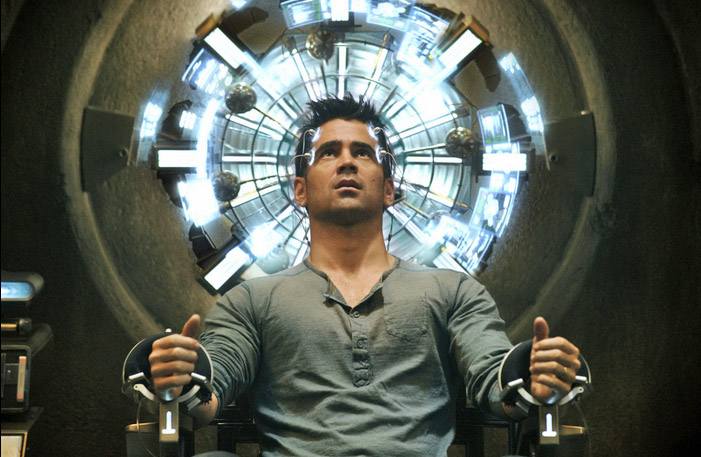The two greatest contrasts between this new "Total Recall" and the 1990 unique are that no scenes are set on Mars, and it stars Colin Farrell rather than Arnold Schwarzenegger. Mars we can manage without, I assume, despite the fact that I adored the enhancements making the human station there. This film has its own explanation you can't head outside and inhale the air.
Be that as it may, Schwarzenegger, presently, is another matter. He's supplanted as the legend Quaid by Colin Farrell, who in mark of reality is most likely the better entertainer. Be that as it may, Schwarzenegger is to a greater extent a film presence and more qualified for the job of an injured bull staggering around in the china shop of his recollections. The story includes a man who is involved without his insight (or memory) in a contention between a totalitarian system and an obstruction development. The two movies open with him blissful and cluelessly wedded (to Sharon Stone in the first, Kate Beckinsale in this one). In both, he is malcontented with his life. In both, he finds that all that he assumes he realizes about himself is imaginary, and his recollections have been all embedded.
The monstrosity of this disclosure is better reflected by Schwarzenegger, who appears to be more injured, more confused, more sold out — and accordingly more frantic. In the Farrell execution, there's all the more a feeling that the person is being cleared alongside the occasions.
The inventiveness of the plot, roused by a Philip K. Dick story, is taken care of well in this adaptation, coordinated by Len Wiseman, and in Paul Verhoeven's 1990 variant. In both, there are sections in which Quaid has no clue about what to accept and should conclude which of different characters can be relied upon. The two movies are cumbersome with constant activity, however there's greater humankind in the previous one, and I think we care more about the legend. A film that truly treated this reason in a serious way would presumably play more as nolan Christopher's "Token," following a man hapless in his own course of events.
Yet, enough around 1990. In the new film, Earth is dreadful in view of synthetic fighting, with the exception of two regions: an organization fixated on the English isles and a province on the previous Australia. Laborers from the province give plant work to the organization, which evades the drive time by connecting them in what seems to be a passage straight through the Earth. That is a great deal of work to go to get modest work; Quaid's plant work includes fixing two screws on the breastplates of robot troopers being fabricated by the league. These robots have a perfect plan, are smooth and gleaming high contrast, however are evidently goof balls. I can't recollect a solitary robot doing significantly more than walking in sync and getting itself obliterated.
The film makes an itemized showing of making its urban communities, which in the organization is a transcending modern wonder, and the province is by all accounts endless little huts unendingly stacked on top of each other, similar to the homes you can see sticking to the sides of different structures in Hong Kong. Quaid engages in pursues in the two spots, which require the capacity to bounce from extraordinary levels without breaking his lower legs, or (it appears to me) his legs. One smart pursue grouping includes his personality and an obstruction part named Melina (Jessica Biel) hopping onto and off a labyrinth of vertical and even lifts; it's kind of an activity form of extremely complex chess.
